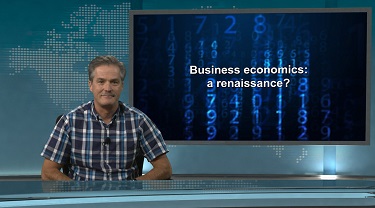“I’ve yet to meet a wealthy economist.” That was the greeting I received at a conference some years back from a prominent Canadian. It was a comment on relevance and accuracy, I’m sure. Anyone who’s placed a bet on a bad prediction would feel the same. And there have been many of those: $200 oil, when it ended up at $35; a 50-cent Canadian dollar when it actually soared to parity. Economists are reputed to have successfully predicted seven of the last three recessions. And on it goes. Yet business economists still make headlines, and figure prominently in strategy conversations. Does it make any sense?
To many business grads, the economics classes are not their greatest memory. Amid the tangible courses like finance, accounting and marketing are the more abstract swooshes of average this and marginal that, outrageously simple assumptions, elasticities that may or may not make intuitive sense, and a host of other notions that make up modern economics. And the more you study it, the more arcane it seems to get.
Like the economic cycle, the profession has gone through its ups and downs. It has shone in times of crisis, as in the Great Depression. It has had its rough patches, like the stagflation years of the 1970s. The rise of econometrics with its adaptations of complex physics models to not only emulate but also predict the economy launched economics into the scientific world and created a stir of excitement about its capabilities. In practice, inaccuracies proved a great initial disappointment for everyone … except, of course, the stand-up comics.
Business never completely gave up on the profession, but the well-staffed economics departments of major corporations dwindled over time, and being cost centres, remained permanently vulnerable to corporate restructurings, mergers and economic downturns.
Left here, the prognosis is bleak. But two key developments suggest a revival in the usefulness and relevance of business economics. First, new financial regulations mandated in the wake of the financial sector’s near-death experience in 2008 require scenario analysis for the purpose of contingency planning. This has caused a general beefing up of analytical capacity, and many are hiring quantitative economists and onboarding econometric models to generate alternative scenarios that are foundational inputs to the process.
A second development is technology-driven. The fancy econometric machines initially built in the 1960s and ’70s were a bit like da Vinci’s helicopter: they worked in theory, but in practice, were well ahead of the technology needed to drive them. In the case of economics, it was data quality and computing power that held econometrics back. Over time, vast improvements on both fronts have increased the capacity of economic machines to increase business intelligence.
Where will it lead? Well, it seems it has only just begun. Massive amounts of new data are being created on a continuous basis, not just by official agencies, but at the company and consumer level, thanks to smart machines, automobiles, scanning systems and so on. Collecting these unlimited data points and organizing them appropriately is taking the business world by storm. Deriving conclusions from data requires complex correlation and causation exercises best done by machines—and skilled econometricians. Remaining competitive will increasingly require a sophisticated approach to data management and interpretation—the sandbox that good business economists play in expertly.

















